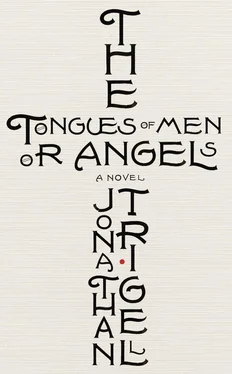Some of the disciples have scattered, but the Three Pillars remain in Jerusalem: James and Jochanan and Cephas. Every day they continue to meet together in the Temple courts. They remember their brother, murdered by Rome. Yeshua, who was the brother of them all, but was the brother of James through flesh and blood, mother and father.
The Pillars go to the Temple at the time of prayer and they do not flip the tables of the moneychangers; they do not whip the lackeys of the aristocracy; those moments have passed, at least for now. They go to the Temple and gather at Solomon’s Portico with others of The Way and they pray. They are continually in the Temple blessing God. Celebrating the sacrifice of unblemished lambs, whose portions are burned to ascend to the heavens. There is no smell sweeter than the unguent luxury of lamb fat; it is little wonder that it pleases Yahweh.
Though the Temple is the most beautiful edifice on earth, above it the sky is born daily of such new blue that the greatest arts of mankind can seem like the pebble and twig assemblies of a child. Even still, it is only through the prescribed sacrifices at the Temple that God’s people can truly worship Him.
The roof of the Temple building is covered with sharp spikes to stop birds resting upon it and soiling, but at the western wall swallows swoop. Black daylight bats, with wings that cut the sky, like reason through myth. Plucking from the air the flies that might despoil this most sacred place. They build their nests in the fissures between the giant blocks. The renovations of the Temple — started by Herod the Great, whose bones are already shard and dust — even now are not completely finished. But the works have taken so long that many generations of swallows have come back here to nest each year and to die here, or to die en route or to die in distant lands not blessed with a temple like this one. There is no temple like this one. The swallows were the first pilgrims and they will be the last.
Sometimes the Three Pillars walk past the Antonia Fortress as they go to the Temple. Sometimes they pass Roman soldiers, men who stiffly raise one arm and bark, ‘Hail, Caesar,’ when they greet each other. Men who brandish spears with spikes as long and cruel as that Gethsemane night. Men who speak in a tongue that the Three Pillars do not know and do not wish to know, or even wish to hear. And when the Pillars pass such men, Cephas drops his head to avoid meeting their eyes, not because he is scared but because even a glance held too long from someone who looks like Cephas can seem confrontational. And the Pillars do not wish to challenge again the might of Rome. Not for now.
Cephas was Yeshua’s right hand. But James was his very heart. James was his beloved brother and James rules the movement now.
Increasingly, as The Way has gained more adherents, there are many who never saw Yeshua, who will naturally ask what he was like. And when they ask Cephas this, he will usually say: ‘He was a lot like James. Though even more like James than James is, if there can be such a thing as that.’
And those who then look at James to see his brother see a man who is tall, though not abnormally so, handsome, but not quite enough to make maidens blush, and celibate, so they would have no need to, dark of eye and skin and hair, as most of the desert dwellers are, a man who walks and speaks and delivers judgements with confidence, but not with pride, who bears some kind of secret fire in his chest, which pulls others to him, as iron is drawn to lodestone; but first, of course, they see a devout and pious Jew.
And of the other Pillars — the three leaders — there is Jochanan, a man who has a space where his beard doesn’t grow. A place that must have been a scar — that is a scar, rather, that must have been a wound. That must have been an injury hard to survive, from blood and breathing alone, without the risk of infection, in this world of gangrene and running sores. And yet Jochanan remains alive, a man with a deep wide scar across his windpipe, not so strange perhaps, in Jerusalem, where all things are.
And then there is Cephas, who has not been cut open, but if he were to be, his innards might surprise. Cephas is like the sabra, the cactus fruit: an exterior calloused and thorny, hard as bark and sharp as swords, but sweet and tender inside.

The Three Pillars are in the house of John-Mark’s mother, where they often meet, when Barnabas the Cypriot comes in and with him another man. A man of thirty-five or so, with thin wisps of hair that sprout from his scalp, like faint feathers on the head of a just-hatched chick. He has legs too bandy to block a bolting dog, but they are sturdy, calves bulged as if accustomed to walking great distances. A man with faraway eyes, which glint with things that others cannot see.
‘So this is the one you told us about, Barnabas,’ says James, in a grim whisper. ‘Saul who persecuted and now claims to belong. The one who had a man flogged until his bones were bared of flesh and he died at the whipping post. This is the Saul who stoned Stephen and crushed his skull. Do you think we’re pacifists here, Temple Guard? Do you think that when struck we turn our heads to be hit again? Should we believe that you haven’t come to spy on us or provoke us? Tell me why Cephas shouldn’t gut you like a goat while we have you here alone and unarmed.’
A quiver of fear shifts across the face of the man called Saul — quick as the ripple on a pond’s surface as a fish snatches a fly — but then it is calm again. Whatever else he is, he is brave.
‘God has forgiven me,’ Saul says, ‘so those who would follow His will must, I suppose, forgive me too. I have been called, and since you must know how this feels, you should know what it looks like.’
And it is undoubtedly true that Saul looks like a man who, with his entire mind, is convinced that he has spoken with God. It is present in his piercing eyes and in his almost eerie smile.
James smiles too. ‘I’m testing you a little, or toying with you perhaps. Yeshua once had us eat with a tax enforcer — a son of Abraham who profited from the misery he inflicted on his brothers. Just as long as he repented and made the restitution written in the Torah, Yeshua said he was as worthy as any of us. We must draw all our fellow Jews into the coming Kingdom and those who come last are the most treasured. The man who is hired at the eleventh hour will have the same wage as he who has toiled all day. So you are welcome too, Saul. You are the most welcome of them all.’
And each of the Pillars in turn then embraces Saul and kisses him. James holds him last and longest. It is a strange and marvellous thing, perhaps, for Saul: to touch and smell the physical brother of a person previously encountered as sound and light. Stranger still when James sits him down and slowly, gently, washes the dust and dirt of the world from Saul’s feet. The act is almost too intimate for Saul to bear: he feels as if it would be easier to flee than to take such forgiveness. But he remains, while James presses his feet dry with a cloth.
Then together, with earnest pleasure, they all recite the prayer that Yeshua taught: hallowing the name of Abba ; calling for the remission of debts; for enough bread for all; for deliverance from this present evil; for God’s Kingdom to come, here on earth.

Later, they eat, the oldest bond of men, and they talk and chew by turn. Jochanan tells Saul how attitudes have softened to those of The Way in the years of his absence. Perhaps because the high priest and his party now see the Nazarenes as no immediate threat, since they wait for the return of Yeshua before further action. The aristocrats are all Sadducee fools and don’t believe that the dead will rise. And if you doubt that simple fact, it is hard to be afraid of one who is coming back. But The Way has grown in political strength too: it now counts many leading Pharisees and other well-respected Jerusalemites among its number. Even the great Gamaliel is a sympathizer, so perhaps the Pillars are harder to persecute openly.
Читать дальше













